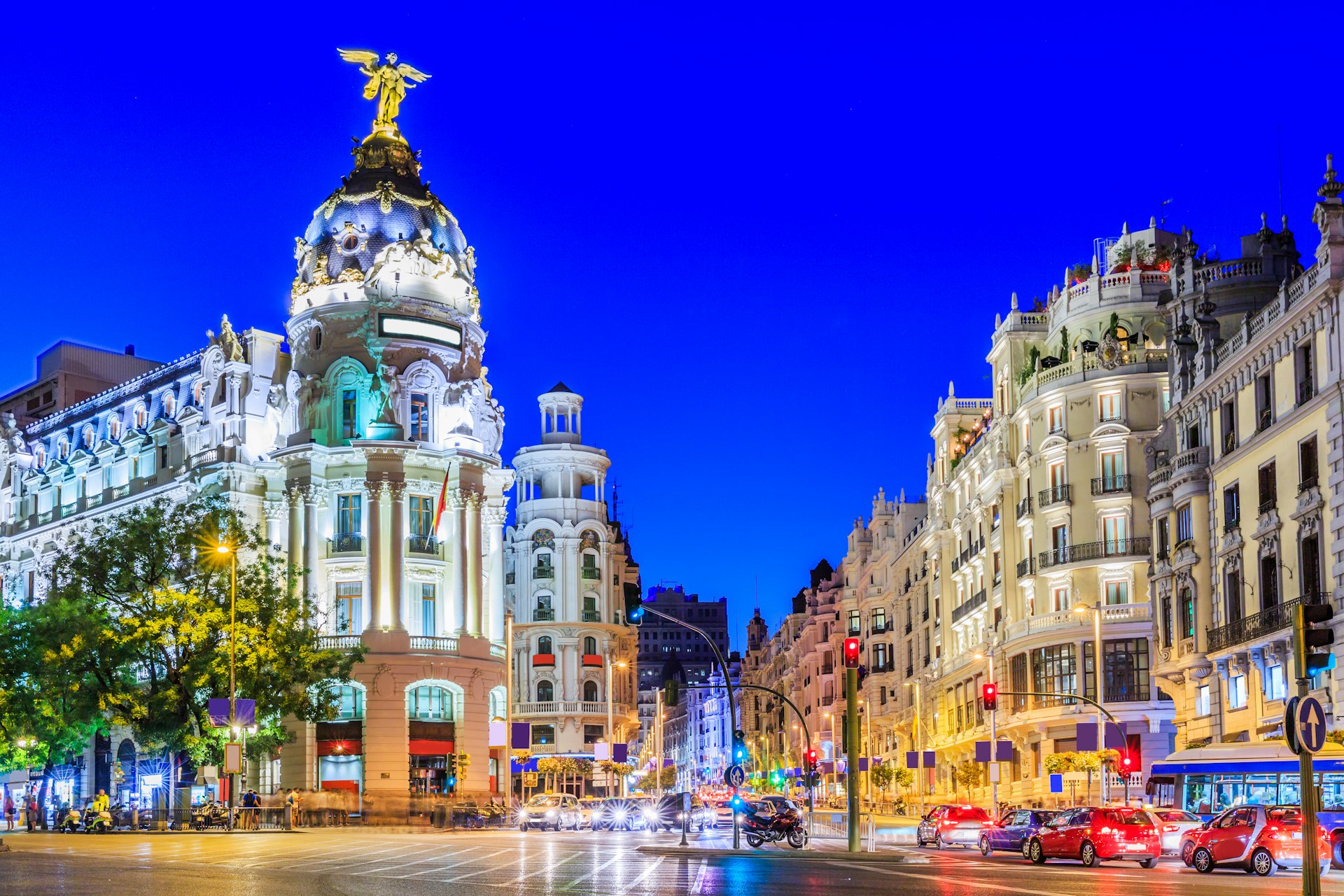It doesn’t take long for visitors to discover that there are few cities as easy to get around as Madrid.
A public transportation infrastructure that includes an efficient and reliable subway system, an organized bus network and late-night buses, long-distance high-speed trains connecting to outlying Spanish towns, and even electric bikes with charging docks, all make Madrid a highly commuter-friendly capital.
Additionally, travelers with reduced mobility will be happy to find Madrid’s bus and subway vehicles and stations specially designed for universally accessible travel, one hallmark that makes the Spanish capital stand out as a world-class tourist destination.
Here’s what you need to know to make the most out of Madrid’s public transportation network.
Get around on Madrid’s excellent Metro system
The Madrid Metro is an iconic and inextricable part of city life. In 2018 the Spanish monarch King Felipe declared, “Madrileños should be proud of their transport network,” when he surprised commuters by joining them on the centennial anniversary of the Metro to mark a century after his grandfather King Alfonso XII inaugurated the underground railway system in 1919.
Arguably one of the best and biggest European subways, the Madrid Metro consists of 12 metro lines, 3 tram lines and over 300 stations that neatly link up the city. Open from 6am to 1:30am, Metro trains pass by every 2 minutes during the busiest times of the day, and every 15 minutes after midnight. For travelers flying into Madrid, the Adolfo-Suárez Madrid Barajas Airport connects directly to the busy Nuevos Ministerios central hub, from where you can easily get around Madrid.
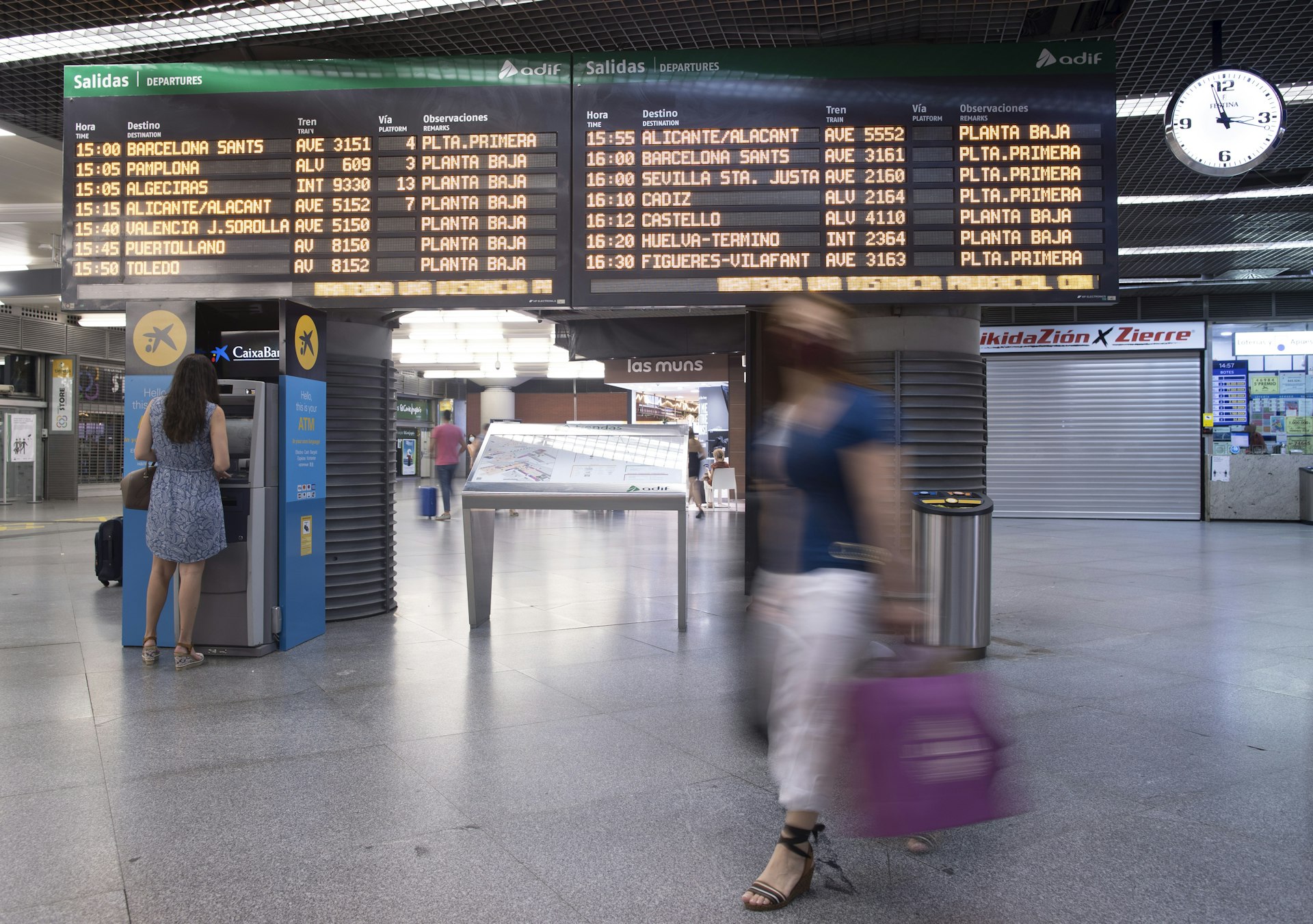
Catch fast suburban trains out of Madrid
Day-trippers and city breakers, the Cercanias Renfe is your portal to some of the most picturesque villages on the outskirts of Madrid. These fast suburban trains accessible via the Atocha Metro station (Line 1) rapidly transport you to quaint towns, World Heritage sites such as San Lorenzo de El Escorial and Alcalá de Henares, and even premiere ski and hiking destinations such as Cercedilla at the foot of the Sierra de Guadarrama mountains.
Counting nine lines threading through the Madrid region, the Cercanias trains run every day from between 5am and 6am up to midnight. While your metro ticket gives you access to some Cercanias stations that are part of the Metro network, you will still need to purchase separate tickets, the Bonotren, to travel to the long-distance destinations.
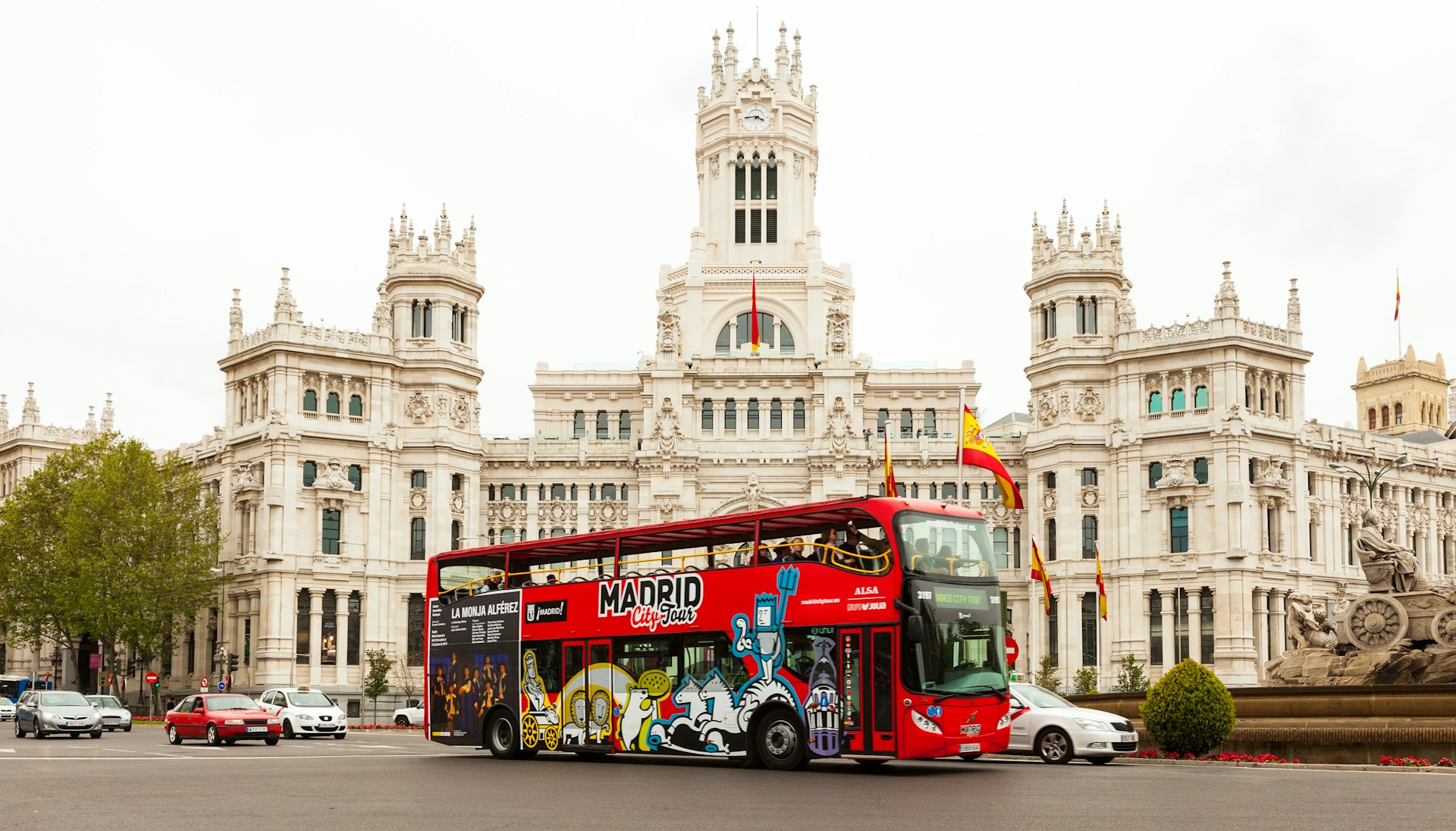
A sightseeing tour or riding the city bus is a scenic way to see Madrid
While getting around Madrid via bus or autobús may not be as fast as taking the Metro, it is certainly the scenic option. Given that the center of Madrid has a lot of interesting sights with its architectural landmarks, intricately carved fountains and expansive green spaces, taking the bus is an excellent, cost-effective way to sightsee if you’re not pressed for time.
EMT Madrid has over 200 bus lines in the city
EMT Madrid is the public bus service that runs from 6am to 11:30pm, with over 200 bus lines. A recent push by the local government to have more environmentally friendly vehicles has led to three zero-carbon-emission buses that are free to use (001 Atocha Renfe-Moncloa, 002 Puerta de Toledo-Argüelles, and C03 Puerta de Toledo-Argüelles). For night owls enjoying Madrid’s world-famous nightlife, there are 27 aptly named “Búhos” or “owl” night buses, marked with an N, that are accessible from Plaza de Cibeles after 11:30pm.
Interurban buses are good for regional transport
Also known as Madrid’s Green Buses, these are privately owned and managed by different transport companies. These intercity buses are a comfortable and reliable option that connect you to different municipalities in the region. You can purchase single tickets directly from the driver or vouchers for ten trips from the bus station kiosks.
Go eco on an electric bicycle
BiciMAD is a relatively new transport service that provides 7500 electric bikes distributed over 611 charging and docking stations strategically placed around Madrid. This is an eco-friendly and convenient way to explore the city, not to mention a great way to keep fit. Madrid has lots of bike-friendly routes all over the city. Use the BiciMad app to find bicycle docks and stations and pay the tariff, which starts at €2/hr.
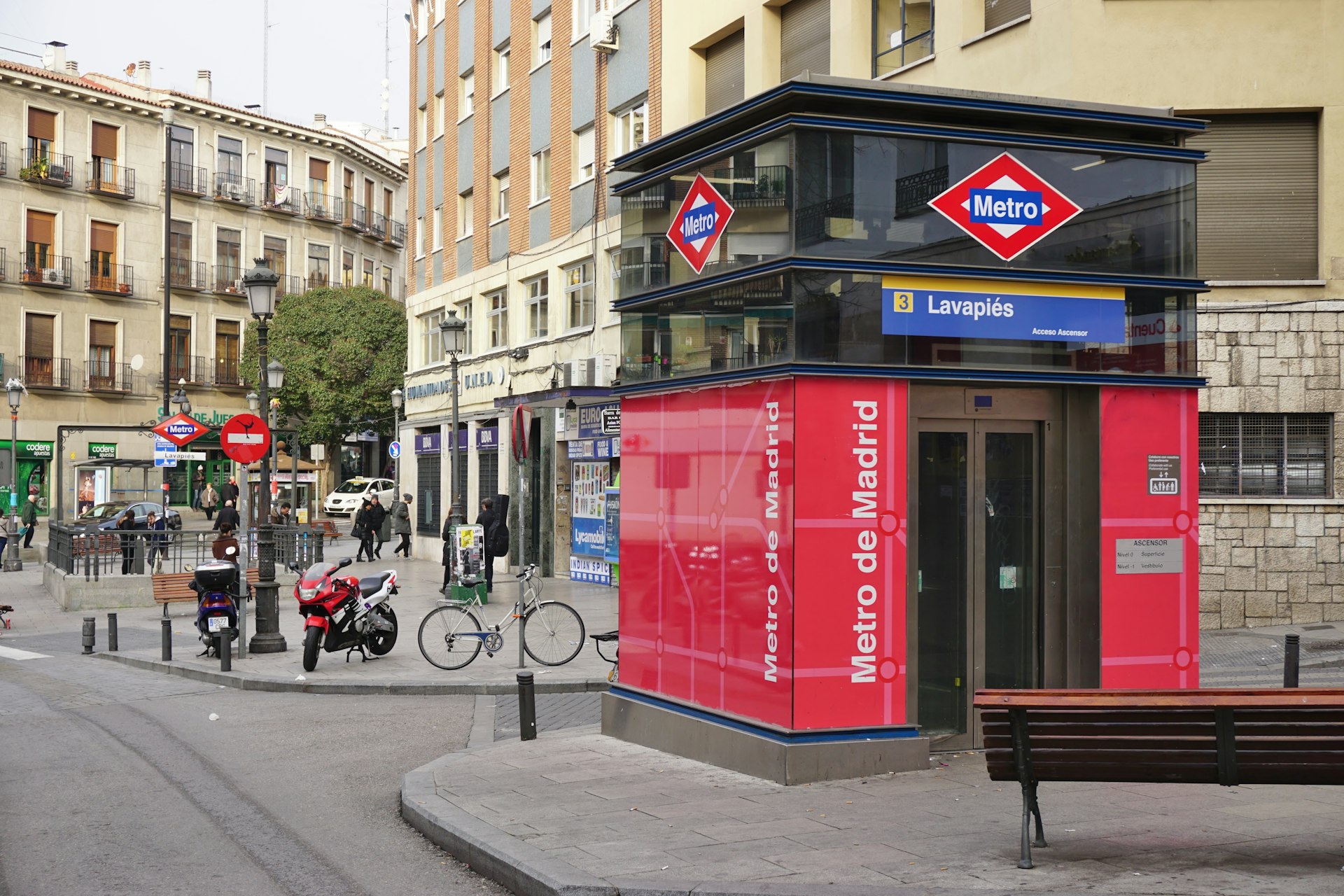
Accessible transportation is improving in Madrid
In recent years, Madrid’s trains and stations have been significantly upgraded to become more accessible for people with disabilities. With the end goal of giving full autonomy to disabled passengers so everyone can enjoy equal access to public transport, the Metro has installed universal accessibility features in all its stations, with over half of all stations fully accessible with lifts and ramps for wheelchair access. Among several other accessibility measures, step edges are reinforced, and elevator signs and handrails have Braille markings.
All EMT buses have features specially designed for universal access, including low floors, Braille-embossed stop buttons, reserved spaces for baby carriages and reduced mobility passengers, plus tilts and ramps for wheelchair users.
One useful resource for travelers with disabilities is the comprehensive Accessible Tourism Guide developed by the Madrid Tourist Board, working jointly with PREDIF (the Spanish Representative Platform for the Physically Disabled).
For further information on traveling with a disability, download Lonely Planet’s free accessible travel resource.
Join the locals on a car-sharing website
Car-sharing services are also a popular mode of transport if you want to visit Madrid’s regional towns or other nearby Spanish cities. This is a good way to be more economical with longer distance destinations, not to mention meet and practice your Spanish with locals. The most popular service, BlaBla Car, lets you book car-share rides to several points around the Madrid region and all over the country. If you’re driving solo and wouldn’t mind some company (and sharing the gas bill), you can also publish your own rides and indicate your intended destination on the BlaBla Car website.
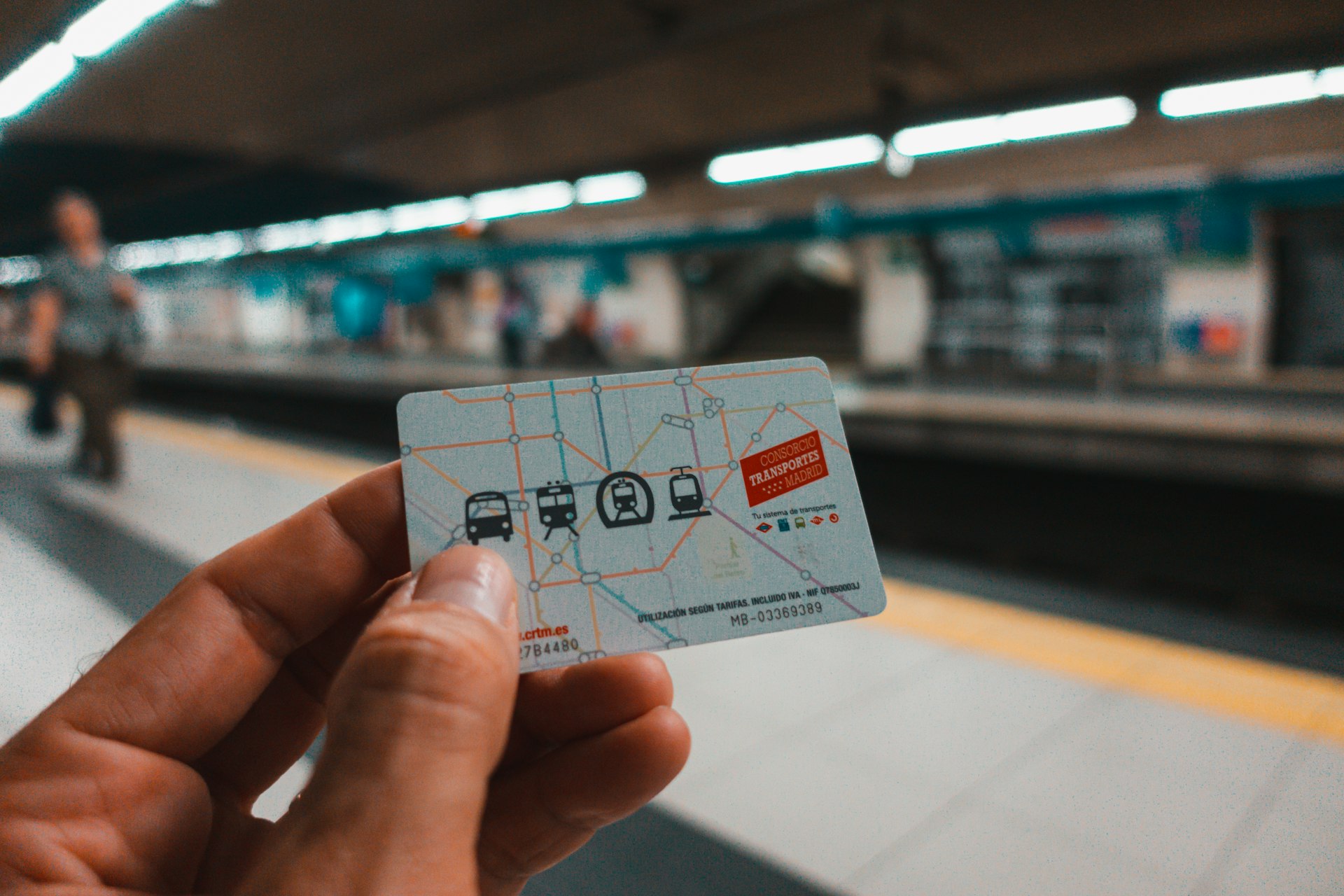
Which public transport ticket should I buy in Madrid?
For visitors, the most practical and cost-effective option for multi-modal travel is to purchase the Tourist Travel Pass, a contactless card that you can get at any Metro station. This allows you to hop on all types of public transport around Madrid, which includes the Metro, bus lines, light rail and Renfe suburban trains.
Bus tickets can be loaded onto the Tarjeta Multi (commonly called Multi card) available at any Metro station or on the Tourist Travel Pass. You can also pay for single bus trips with cash or contactless credit cards. If you’re paying with cash, however, better to have small bills or exact change to hand — or you’ll be met with bewildered stares from bus drivers who will tell you they can’t change your €20 bill!
Don’t throw these smartcards away once you’ve used up the rides — they are transferable and valid up to 10 years, and you can simply top them up in any Metro station on your next visit to Madrid.
